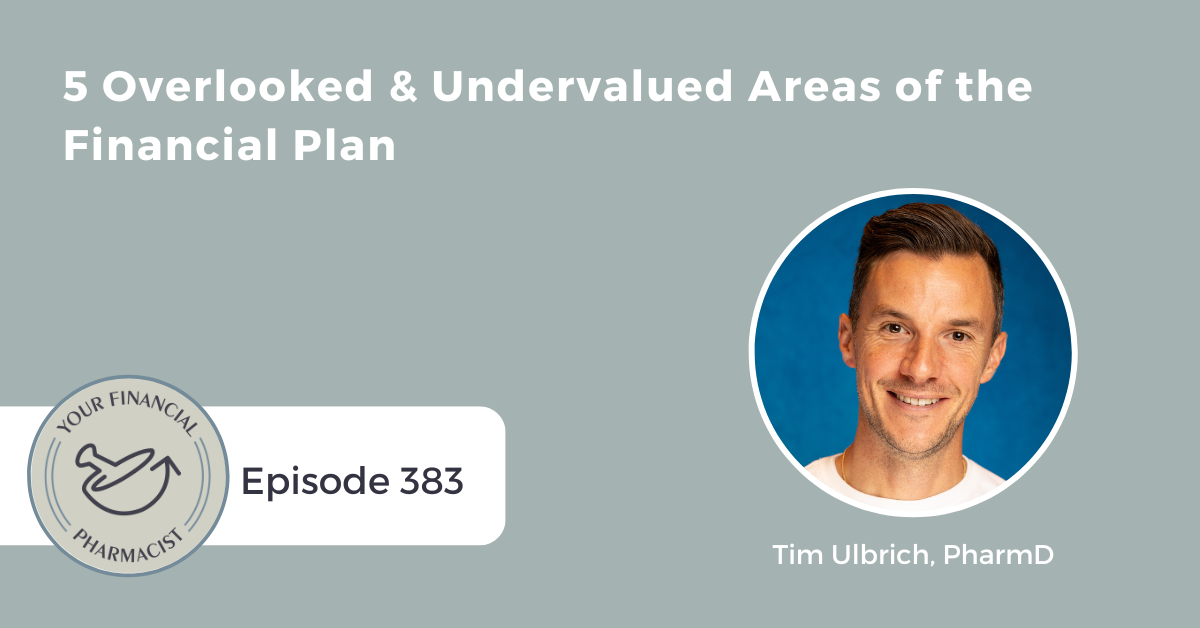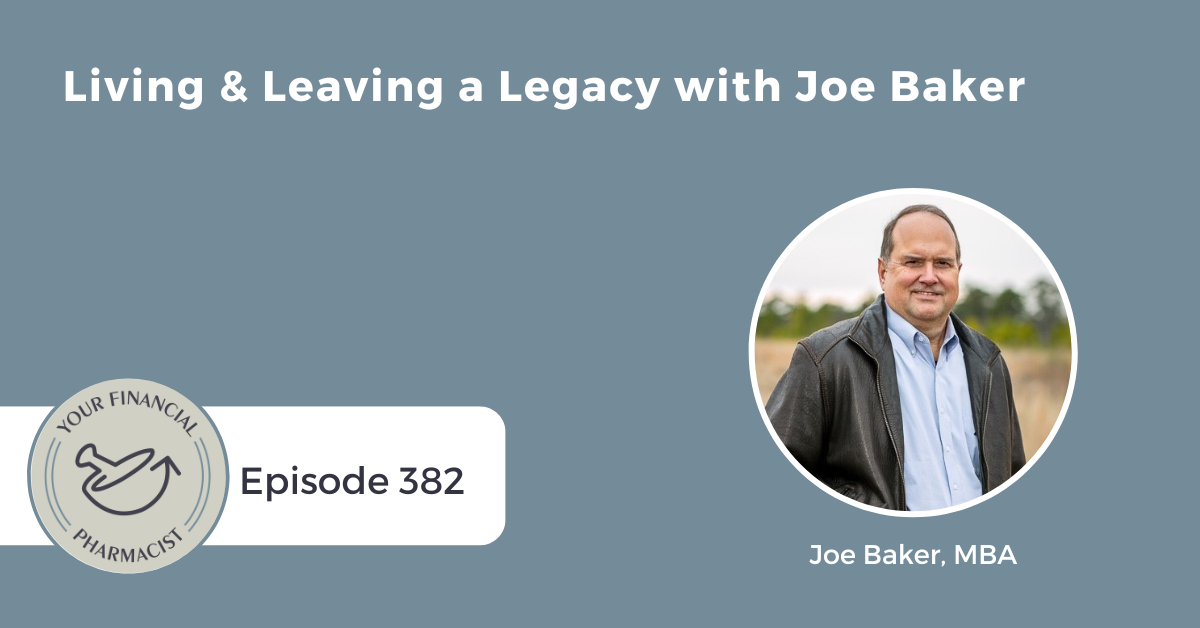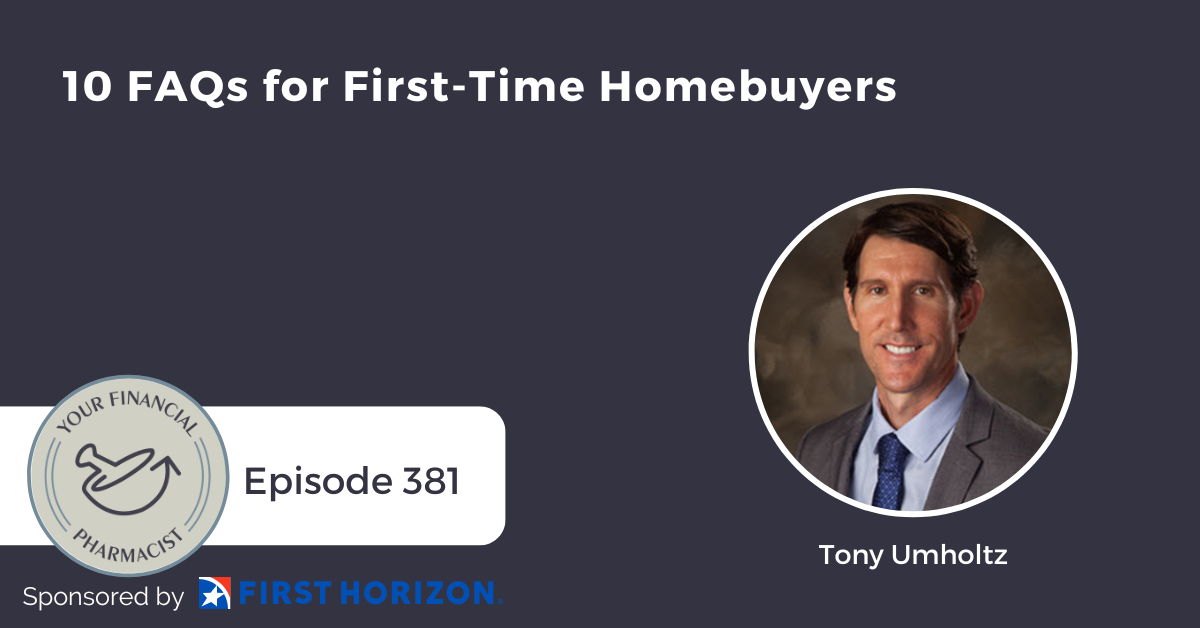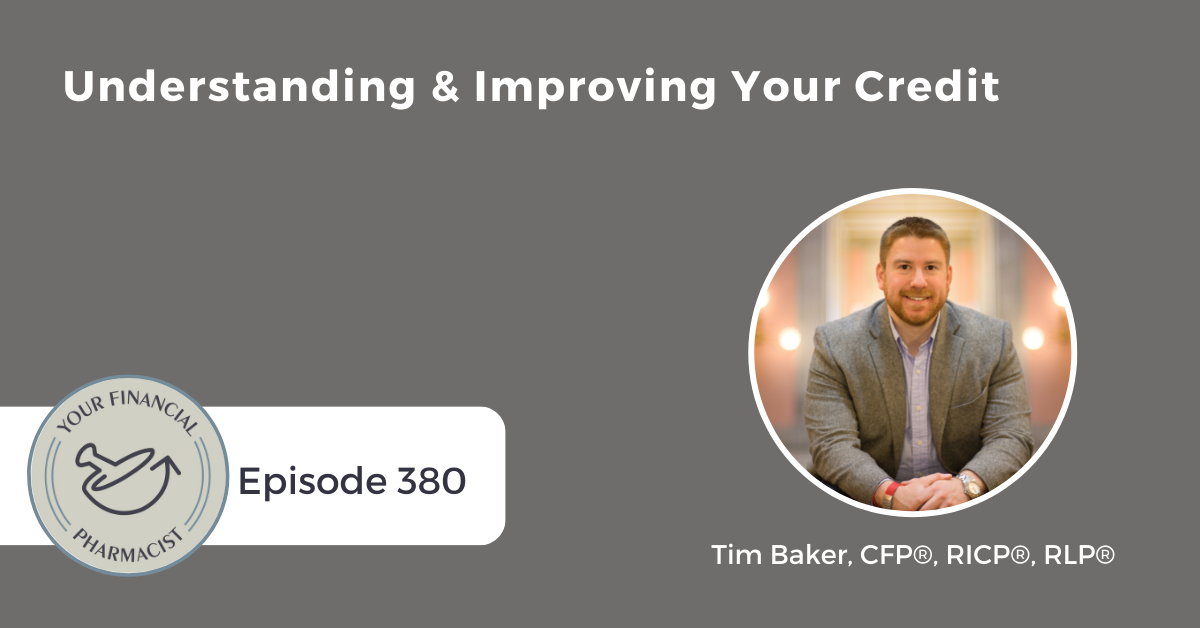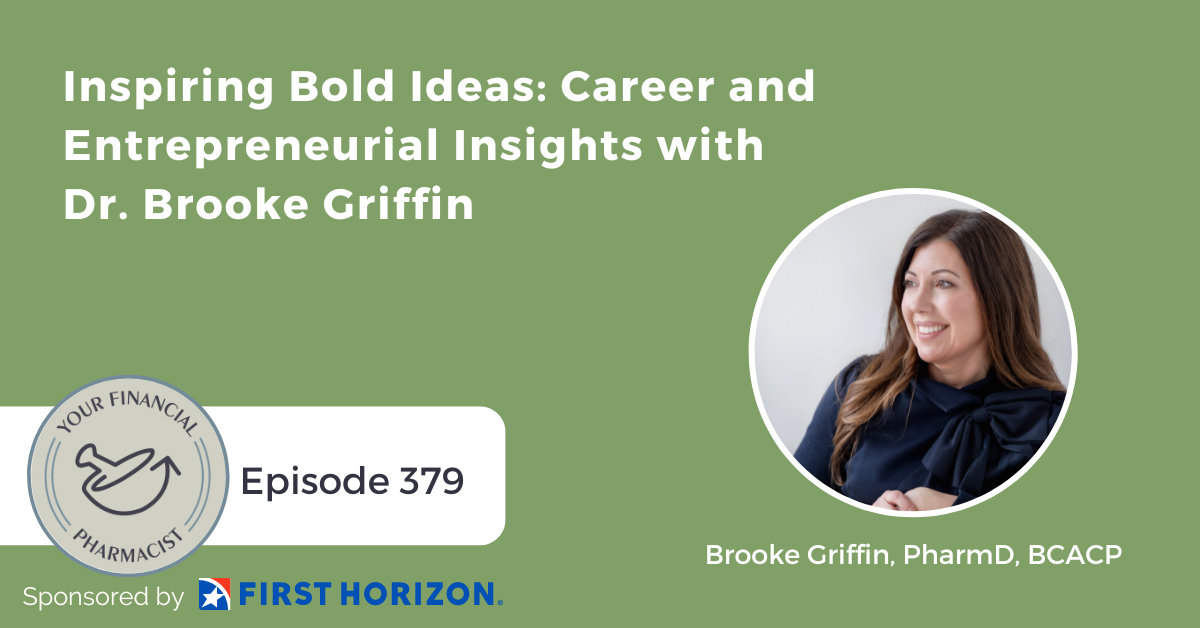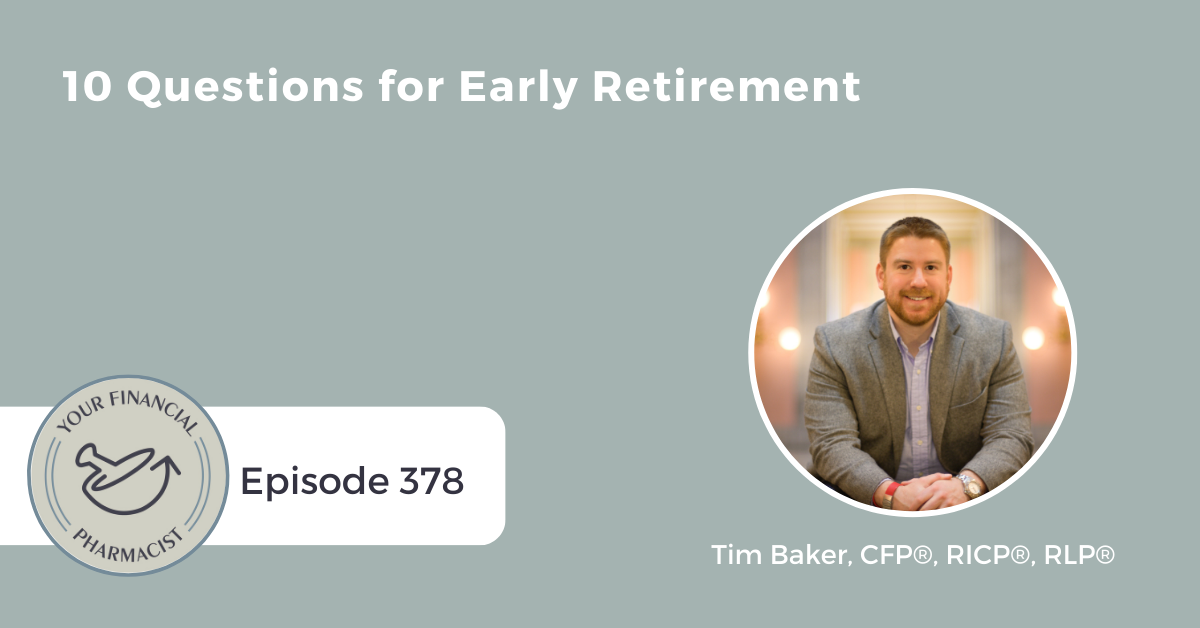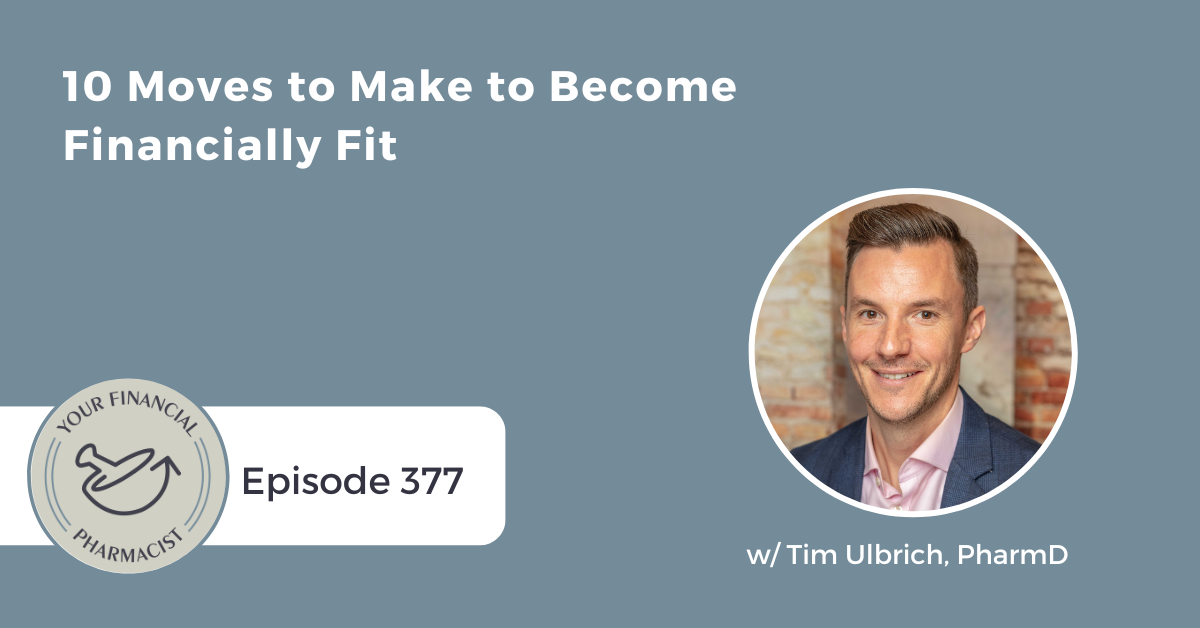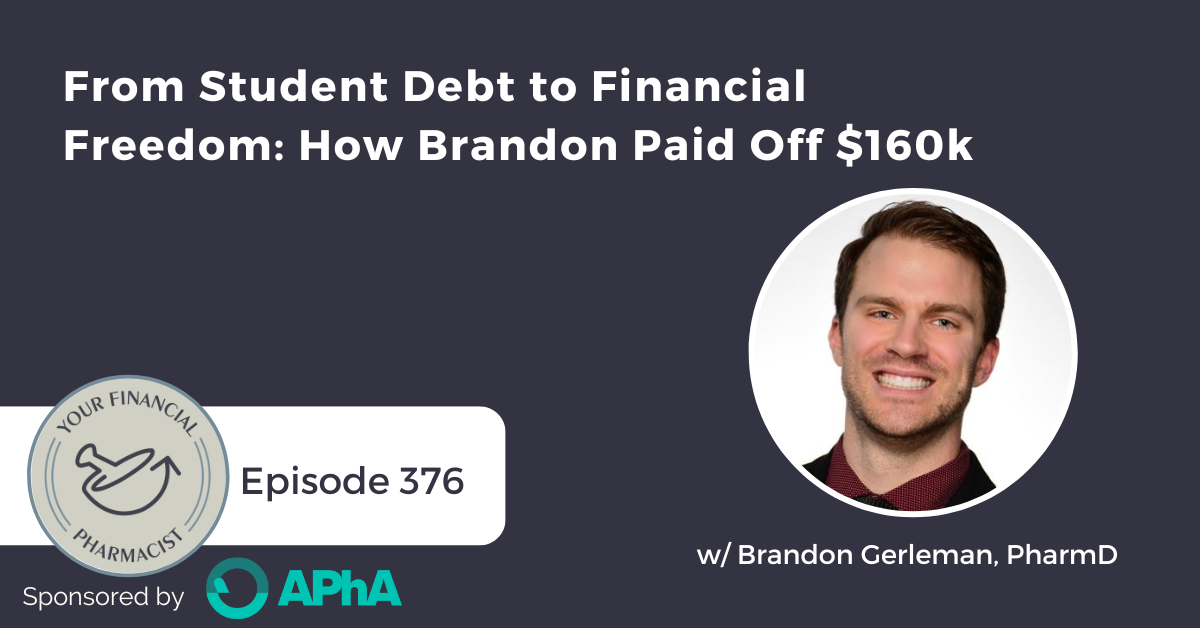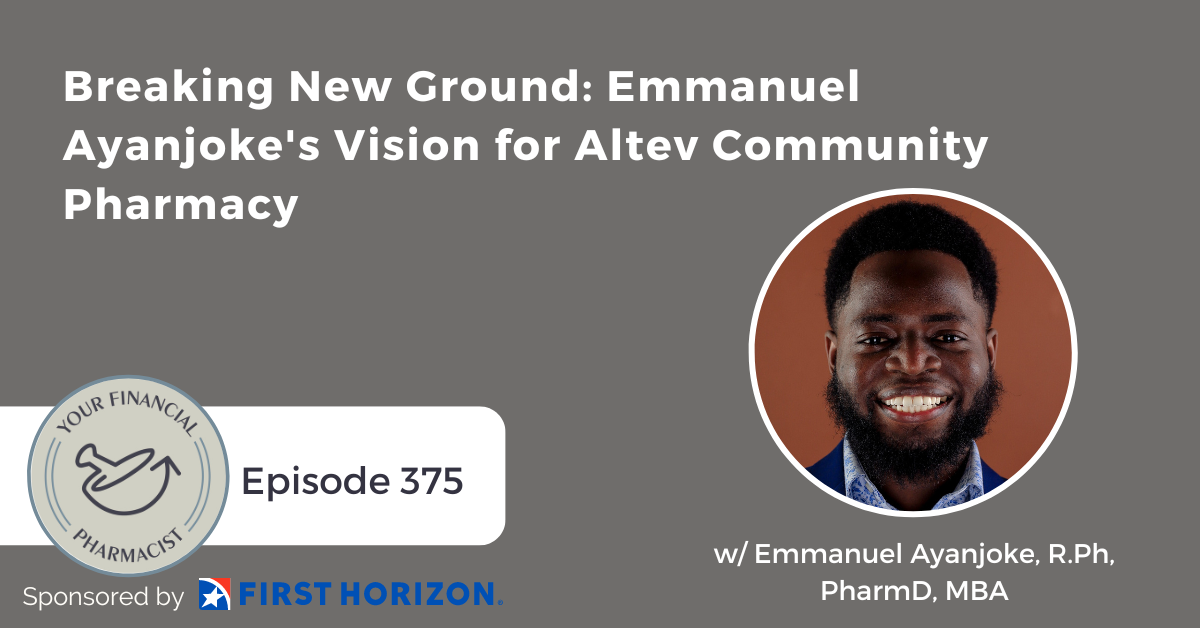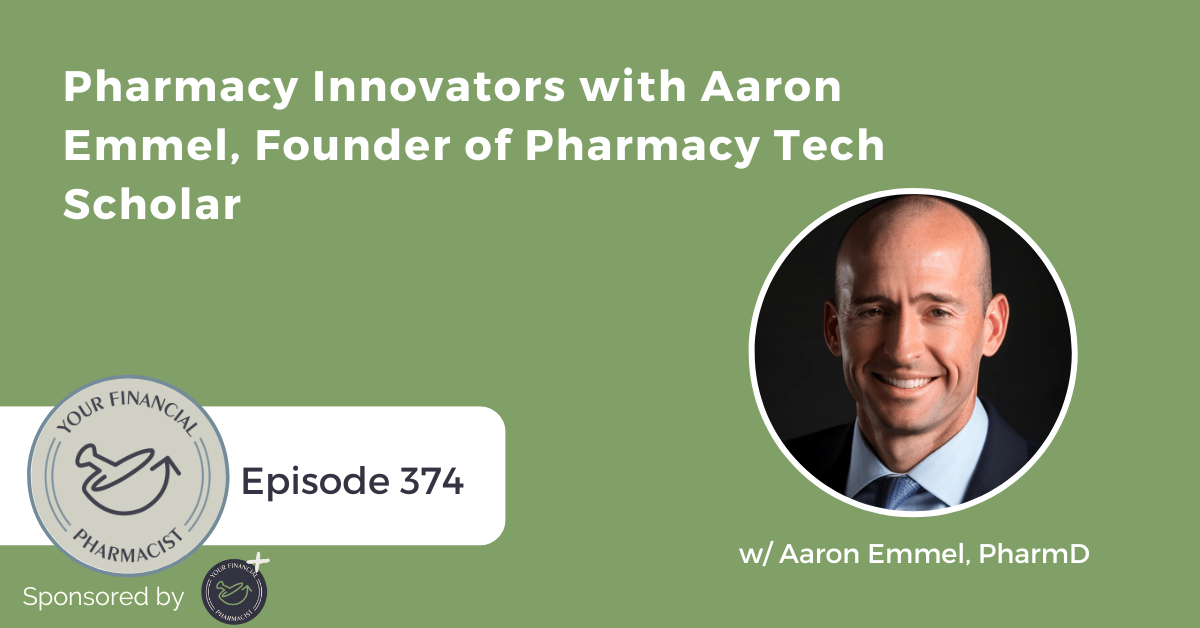Tim Ulbrich, YFP CEO explores five often-overlooked areas of financial planning from credit, tax planning, emergency funds, insurance, and estate planning.
Episode Summary
Tim Ulbrich, YFP CEO, dives into five critical—but often overlooked—areas of financial planning that deserve more attention. While these topics might not be as thrilling as investing, making big purchases, or debt reduction, they’re essential for a strong financial foundation. Tim covers the importance of: building and maintaining credit; proactive tax planning; establishing an emergency fund; reviewing health, life and disability insurance policies; and estate planning.
Learn how to give these areas the attention they deserve, helping you create a more resilient and well-rounded financial plan.
About Today’s Guest
Tim Ulbrich is the Co-Founder and CEO of Your Financial Pharmacist. Founded in 2015, YFP is a fee-only financial planning firm and connects with the YFP community of 15,000+ pharmacy professionals via the Your Financial Pharmacist Podcast podcast, blog, website resources and speaking engagements. To date, YFP has partnered with 75+ organizations to provide personal finance education.
Tim received his Doctor of Pharmacy degree from Ohio Northern University and completed postgraduate residency training at The Ohio State University. He spent 9 years on faculty at Northeast Ohio Medical University prior to joining Ohio State University College of Pharmacy in 2019 as Clinical Professor and Director of the Master’s in Health-System Pharmacy Administration Program.
Tim is the host of the Your Financial Pharmacist Podcast which has more than 1 million downloads. Tim is also the co-author of Seven Figure Pharmacist: How to Maximize Your Income, Eliminate Debt and Create Wealth. Tim has presented to over 200 pharmacy associations, colleges, and groups on various personal finance topics including debt management, investing, retirement planning, and financial well-being.
Key Points from the Episode
- Importance of credit in the financial plan [0:00]
- Shifting mindset from tax preparation to tax planning [3:30]
- Setting up an emergency fund [9:51]
- Reviewing insurance coverage [13:31]
- Estate planning [19:51]
- Invitation to consider YFP’s financial planning services [24:57]
Episode Highlights
“[Life insurance] is especially important for those that have a spouse, a partner, a significant other, or dependents that are reliant upon your income or partially reliant upon your income.When we think about the purpose of a life insurance policy, one of the main purposes is income protection.” – Tim Ulbrich [13:31]
“I really want you to shift your mindset to think proactively and strategically about your tax situation. And I recognize that sounds obvious, but I used to view, as perhaps some of you may, tax very much to be as something in the rear view mirror.” – Tim Ulbrich [6:30]
“According to a 2023 caring.com survey, two out of three Americans do not have any type of estate planning documents in place, and that makes sense, right? It’s not super fun to be thinking about, but the whole purpose of the estate plan is that we want to have a process to arrange the management of our assets.” – Tim Ulbrich [22:57]
“What we should also be doing practically here is making sure that we check our beneficiaries on our various accounts, and as we have talked about before on the show, updating or implementing a legacy folder, which is an important one stop shop where you have all of our financial documents and information.” – Tim Ulbrich [24:00]
Links Mentioned in Today’s Episode
- Episode 380: Understanding and Improving Your Credit
- IRS Form 1040 (Individual Income Tax Return)
- YFP 309: Top 10 Tax Blunders Pharmacists Make
- YFP Blog: Life Insurance for Pharmacists: The Ultimate Guide
- YFP Blog: Disability Insurance for Pharmacists: The Ultimate Guide
- Caring.com 2023 Wills and Estate Planning Study
- Episode 310: Dusting Off the Estate Plan
- YFP Legacy Folder Checklist
- YFP Book a Discovery Call
- YFP Disclaimer
- Subscribe to the YFP Newsletter
- Tim Ulbrich on LinkedIn
- YFP on Instagram
- YFP Facebook Group
Episode Transcript
Tim Ulbrich 00:00
Hey everybody. Tim Ulbrich here and thank you for listening to the YFP podcast, where, each week, we strive to inspire and encourage you on your path towards achieving financial freedom. This week, on flying solo, to talk about five areas of the financial plan that are often overlooked and undervalued. Now, to be fair, none of these areas are very exciting to think about, especially if you’re focused on more inspiring goals, like investing, making a large purchase, giving or paying down debt, where you can feel the progress, or in the case of something like giving, you can see the impact that that may be having in the area that you’re giving or in your community. But with these five areas, what I’m referring to here are estate planning, the emergency fund, insurance coverage, tax planning and credit that isn’t necessarily the case. And there are instances where, when we are doing well in these individual areas, we might be able to see or reap the benefits of that. But for the most part, this is some of the boring work of the financial plan that we’re really playing defense in several of these cases and making sure that we’ve got that strong base and foundation in place.
Tim Ulbrich 01:04
So let’s take a closer look at each one of these areas, starting off with number one, which is credit. Now we just talked about credit on the Yfp podcast not too long ago, episode 380 we’ll link to that episode in the show notes, understanding and improving your credit score. And as we said on that show at the time, credit is one of those threads that touches many parts of the financial plan, and having good credit puts you in a position to take calculated risks in the form of leverage that could be buying a home, that could be buying a second property, that could be starting a business and doing so at the lowest cost possible. And fair or not, our financial system rewards those who can take on and pay off credit. And I know many of us were told at one time or another, probably by a parent or a family member, to build your credit. Right? Build your credit. But how much does building your credit and improving your credit actually matter? Well, let’s take it look at one example, if we assume that we have two home buyers, let’s assume one has a credit score that is considered excellent at a 10, and another home buyer has a credit score that’s considered fair score of 640 well that might end up being the difference of a 6% interest rate on a 30 year mortgage, thinking of the excellent credit versus a 7% interest rate on a 30 year mortgage, that would be for the person with the Fair Credit Score. Now, what does that actually mean per month and over the life of the loan? Well, the individual who got the lower interest rate because the better credit would have a monthly payment of about $2,400 per month, principal and interest only, and the individual had fair credit would have a higher monthly payment of a little over 2660 per month, again, principal and interest only. Now, over the course of the life of the loan, over 30 years, that ends up being a total cost of loan of 958,000 approximately principal and interest for the individual with fair credit, versus 863,000 for the individual that had excellent credit, same house, same situation, but two people with different credit scores, which shows a difference of about $260 a month, or $94,000 over the life of the loan.
Now if you start to apply this concept is securing other debt, right? Credit card, car purchase, investment property, starting a business, taking on a loan, et cetera. That cost of credit adds up in the form of less favorable lending terms. And since your credit score is a key metric that will be used by lenders to determine how favorable or not the lending terms are, it’s really important that we understand what goes in to the credit score, because the more we understand about those factors, the more levers we can pull to improve our score. And as we talked about on Episode 380, the top factors that impact your credit include payment history, so making sure we’re making on time payments and credit utilization, so the amount of credit that we’re using each month alongside the maximum amount that we’re given. Those two alone make up about two thirds of their credit score other factors, and would be age of credit history, total number of accounts and the number of hard inquiries on your credit. So again, check out Episode 380 and this is something we encourage you to be looking at your credit score on a regular basis as well as polling your credit report, not the same thing as your credit score, to make sure that there’s no negative marks, derogatory marks on your credit report that you’re not aware of, and so that you can clean those up and evaluate those further if need be. So that’s number one on our list of five overlooked and undervalued areas of the financial plan, all right.
Number two on our list is tax planning, with the October 15 extension, filing extension deadline officially behind us. The 2023 tax season is over. I know our tax team is excited about that. There’s a couple outliers because of. Some taxpayers in disaster areas are impacted by the hurricanes that are getting additional time for good reason. Now on that note, did you know that with an extension you have until October 15, right? We typically think mid April, but with an extension you have until October 15 to file your individual taxes, and for those that do that, October 15 extension, which is actually very common for many of our clients at wifey tax, we believe in right over rushed. Extending the deadline does not mean that you are not responsible for payments on any tax due. Incredibly important, right? The IRS expects you will make payments on time, and if not, penalties and interest will be assessed. So the October 15 extension is a beautiful thing. If you’re doing good tax planning throughout the year and don’t have a big balance due, as that would occur, incur a penalty and interest if we don’t pay it on time, or the other side of the equation, if you have a big refund coming, while many of us think big refund equals good, in that case, we just delayed now the time of getting that refund and putting those dollars to work. All right, enough about that. But when we think about tax as one of the overlooked and undervalued areas of the financial plan, similar to credit, right? This is a thread that runs throughout many areas of our financial plan, and I really want you to be shifting your mindset to be thinking proactively and strategically about your tax situation. And I recognize that sounds obvious, but I used to view as perhaps some of you may as well tax very much to be as something in the rear view mirror. Right? We file each year by the mid April, or as you learn here, the mid October deadline to meet the IRS requirements and to account for what happened the previous year. And I remember early on, you know, whether you’re using TurboTax or some software to do yourself, you’re working with an accountant, you kind of hold your breath and wait for the news, right? Am I going to get a refund? Am I going to have a certain amount of due? But we probably didn’t pay too much attention throughout the year, and ultimately, what that led to was either several refunds. That was the case for us early on, that we could have been putting those dollars to use elsewhere throughout the year. So when you go to File each year and we’re finally what happened in the previous year, that’s retroactive, right? And want us to shift our thinking, to be more proactive, and so to move our mindset from tax preparation, that’s important. It’s necessary. The IRS says we have to do it. We have to file our taxes, but to think more in the mindset of tax planning, right? A very important distinction of mindset shift so that we can think proactively and how we can optimize our tax strategy. Now I want to challenge you that if you don’t already know your key numbers, things like your effective tax rate, your adjusted gross income, it’s time to get out the IRS Form 1040 we’ll link to a copy in the show notes, and take 10 or 15 minutes to make sure that you understand the terminology and the flow of dollars. Because when we start to understand how the 1040 flows, we understand these terms, we can really begin to have this concept of tax planning come to life adjusted gross income, just as one example, has very important implications on things like student loan payments for those that are doing an income driven repayment plan, as well as certain phase outs on things like child and child care credits, Ira contribution, student loan interest deduction and so much more. Now on Episode 309 of the podcast, our CPA and director of tax, Sean Richards, cover the top 10 tax blunders that pharmacists have made, as we’ve seen through the filing process. So whether someone has a negative net worth or a net worth of several million dollars, I think you’re gonna find some value in that episode if you didn’t already listen to that. These are mistakes like having a surprise bill or refund at filing. And what are the common causes pharmacists that potentially could be employing something like a bunching strategy for their giving and just not aware of that strategy, those that should be thinking about estimated taxes throughout the year and are caught by a surprise after that, not not optimizing things like the HSA or traditional retirement contributions to reduce our taxable income, and an oldie but a goodie, not factoring in public service loan forgiveness when choosing married filing separately or married filing jointly. So again, make sure to check out that episode. Episode 309. Great time of year to be thinking about that as we’re heading into the 2024, tax season. That’s number two on our list of five overlooked and undervalues areas of the financial plan, tax planning.
Number three on our list is the emergency fund. Now, if you’ve been listening to the podcast for a while, you hear me harping on the emergency fund every once in a while, and because it’s that important, right? Saving for a rainy day, saving for an emergency it’s not easy. It’s not fun. It takes discipline, it takes patience, it takes trust to save for something you can’t yet, see, feel or experience. In the moment, but we all know that it’s not a matter of if, but it’s a matter of when. And so as we’re putting in other key parts of the financial plan, we don’t want something that is likely to happen, although we don’t know exactly what it will be, right, whether it’s a cut in Job hours, whether it’s a health emergency, whatever it might be, we don’t want that to derail our progress in other parts of the financial plan, as I’ve shared before in the show in the not too distant past, Jess and I have had to dip into the emergency fund for an unexpected knee surgery that we had to pay 100% out of pocket because of our health insurance. We had a dislocated elbow for our youngest, a trip to the ER for our oldest, for the busted lip, right? The list can go on. And so life happens. That’s the point, and we want to be ready to be able to incur those expenses. And when it comes to things like health care expenses and unexpected health care expenses, everyone’s insurance is different, right? So we got to look at what is a deductible, what’s the out of pocket Max, and know that we have to have a backstop of our emergency fund at a minimum to cover those things, as well as other emergencies that will come along the way. So this area of the plan is all about peace of mind, as I mentioned, it’s about making sure we’re not derailing other parts of the financial plan. And my experience tells me that when you have an emergency come up, and you have an unexpected expense come up, and we’ve got the funds that are there to handle it, a really important mindset shift happens. It’s not fun to write those checks, but when we’re able to do that, because we plan for it, we go from playing defense to playing offense. We’ve got breathing room, we’ve got margin, and perhaps we can even take some calculated risk in other areas of our financial plan that might have been unthinkable just knowing that we’ve got this backstop, we’ve got this foundation in place. So we’ve talked about the emergency fund at length on the show before. I’m not going to bore you further on this, but we want to be making sure that we’re answering important questions like, Is it adequately funded? Generally speaking, that’s three to six months worth of essential expenses. Everyone’s situation, of course, is different. We need to be answering questions like, do we have too much saved in an emergency fund? Right? There’s value in having a cushion, but having too much of a cushion comes with an opportunity cost, and so have we grown that to a point that we might be able to use some of that for other parts of the financial plan? We need to answer questions like, Are we optimizing our emergency fund? This is not the place that we’re going to take risk necessarily. We want this money to be liquid and accessible and available when we need it, but we also don’t want this sitting in our checking account earning next to nothing, right? So this, this could be in a high yield savings account, money market account, US Treasuries, something that the money is working for us, or at least coming as close as possible to keeping up with inflation. And as I mentioned, you know, with other parts of the financial plan, we want to make sure this isn’t a set it and forget it. So life changes as we progress. Our expenses change over time. And so each year, I would challenge you to look at this once a year to see what is that amount, what’s that target goal when it comes to the emergency fund, and is there a potential boost that is needed to the emergency fund?
Number four on our list is insurance coverage. And there is lots to think about when it comes to insurance, but I want to narrow in on two policies in particular, which would be life insurance and Long Term Disability Insurance. Now life insurance, for obvious reasons, is not fun to think about. Right? Nobody wants to consider what a premature death may look like and how the impact of that would be on their family and on the financial plan.
This is especially important for those that have a spouse, a partner, a significant other, or dependents that are reliant upon your income or partially reliant upon your income. Right? When we think about the purpose of a life insurance policy, one of the main purposes is income protection. So in order to determine how much of a policy we may need, we need to ultimately determine what would be the need if you were to prematurely pass away, and what part of your income that is no longer coming in from work do we need to replace in the form of an insurance policy to be able to achieve various goals that could be paying down a mortgage, that could be investing for the future, that could be saving for kids college, right? What are the things that we would need for this policy to fund lots of work to be done there, and why generic calculations shouldn’t be applied when it comes to things like life insurance. Now there are two main buckets of life insurance. There’s a category of life insurance called permanent insurance. These would be things like whole life insurance policies, universal life insurance policies, variable life insurance policies, variable, universal life insurance policies, right? The alphabet soup of whole whole life and permanent insurance, and then the second bucket is term life insurance. And for the sake of this episode and our time together, I’m going to spend our time there, because I believe that for a majority of folks listening, a term life insurance policy is going to be the way to go. That’s not an absolute. That’s not a. Ice that’s not for everyone, but for many folks, that’s going to be the area of focus. And we’ve got a great resource on this, if you want to nerd out. It’s called the life insurance for pharmacists, our ultimate guide to free resource. We’ll link to that in the show notes. But essentially, with a term life insurance policy, what differs it from a permanent insurance policy it is, is that it is insurance alone. It is not paired with an investment product.
Another important difference is that with a term life insurance policy, as the name suggests, it lasts for a term or a period that could be 15 years, 2025, or 30 years, and you’re going to pay a monthly premium. And for that monthly premium you’re gonna have a set amount that that policy would pay out could be a half million dollars, $1,000,000.02 million dollars, whatever you decide is the need in the event of your death, and once that policy is period is complete, once that term is over, if you’re no longer needing that policy, meaning that you’ve survived or outlived that policy, which is good news, right? There’s no dollars that are coming back to you. So the premiums you’ve been paying each and every month, let’s say you pay 40 bucks a month for a million dollar term life policy over a 20 year period. At the end of 20 years, if we don’t have to enact or use the policy, that’s it. The policy is over. None of those premium dollars are coming back to you, which is the point that is typically used when folks are selling permanent insurance policies that are like, why would you want that money just to go down the drain again? Check out our article life insurance pharmacist, The Ultimate Guide for a more in depth discussion of the different aspects of these policies. This, in my opinion, for most folks listening, why term life insurance coverage is the focus is because this is really meant to be catastrophic coverage, keeping our costs low, so we can use those dollars elsewhere in the financial plan, typically permanent and child policies are much more expensive, typically carry some fees on the investments may not necessarily perform as well as we could invest the dollars on our own, or we’re in working with a professional so with term life insurance, assuming someone is healthy, very much dependent on medical conditions and age of that individual in terms of how much that policy will be, as well as the term or length, but relatively inexpensive for most folks, and is going to allow us to put our cash and dollars to use elsewhere in the financial plan. That’s just a couple key nuggets when it comes to something like life insurance. Now, with long term Disability insurance, one of the greatest assets that you have as a pharmacist is your ability to generate an income. Right?
Think about how long it took you to be able to get that point of becoming licensed, to be able to earn that six figure plus income. And so the focus of long term disability is what would happen in the event that you were unable to earn that income. Now we address the death scenario in something like a term life policy. Here we’re talking about could be a disability, like a chronic medical condition, rheumatoid arthritis, some other condition that would prevent someone from working or working in their position, or it could be something like a car accident, right? Not likely, but these are things that we need to protect if that were to happen, what is the plan to be able to replace your income that you’re earning while you’re able to work as a pharmacist? That’s the purpose of disability insurance. Again, we’ve got a great resource here, disability insurance for pharmacists, The Ultimate Guide. We’ll link to that in the show notes. Lots to think about in terms of how much coverage you might need, the different terms like elimination periods of time, what’s the length of the policy, the potential costs, these are typically more expensive than term life insurance policy.
So make sure to check out that resource from Yfp that we published disability insurance for pharmacists, The Ultimate Guide. We’ll link to both of those in the short show notes. Now, when it comes to purchasing term life insurance and disability insurance, there are a lot of factors to consider. This is one of the reasons why our planning team spends time with our clients individually, going through these policies to make sure they’re customized to the individual. Things like, what’s the goal or the purpose? What are we trying to accomplish with these policies? What employer coverage Do you already have in place, and do we need additional coverage? What are the tax differences between an employer policy that pays out versus a policy on your own? And then, of course, everyone’s situation is different, right? What’s your household income? Is there one income two incomes in the household? What are their goals? What reserves do you have? What expenses are we trying to replace? All these things are going to help us determine what policy is needed, and then from there, we can look to make a purchasing decision that aligns. So that’s number four on our list when it comes to insurance.
Number five, our final of our five overlooked and undervalued areas of the financial plan is the estate plan. Now if you’re listening and you realize that you’ve got some work to do in getting your estate planning documents in place. Know that you aren’t alone. According to a 2023 caring.com survey, we’ll link to that in the show notes, two out of three Americans do not have any type of estate planning documents in place, and that makes sense, right? Just like we’ve been talking about some of these other areas. Nine. Not super fun to be thinking about, but the whole purpose of the estate plan is that we want to have a process to arrange the management of our assets. The management of our property decisions around dependents could be decisions around child care or assets that are going to dependents or others, and in the case of our health, if we were to become, let’s say, incapacitated. Who’s making healthcare decisions? What are those decisions that we want to have made, and making those from a viewpoint in which we’re able to think about those with a clear mind? So that’s the estate planning process in a nutshell, and especially for those that have dependents and have beneficiaries, these are documents that we want to have in place, and just like we talked about with the emergency fund, this is not a set it and forget it. So yes, there’s some upfront work to be done here, from some upfront costs, typically, as well, to do these documents and do them well with a consultation from an estate planning attorney as well as hopefully working with a financial planner. But things change right? Things evolve over time, and we want to make sure that we have a process to update these documents along the way. So the objective with estate planning, yes, it’s peace of mind, right, knowing that we’ve got plans in place for our family, for our assets, for the stuff, for our health care and the decisions that are being made, but as folks accrue assets over time, there are also some tax planning considerations when we think about the transfer of assets that are really important to be considering along the way as well. So practically speaking, what do we need to do here? Well, check out Episode 310, of the podcast, if you didn’t already catch it, where Tim and I talked about dusting off your estate plan. We’ll link to that in the show notes. These are important documents, like wills and living trusts, advanced medical directives, durable powers of attorney.
And at YFP, our financial planning team is are working with clients, one on one to put a framework in place for what are the estate planning needs, and then working with a solution that relies on estate planning attorneys and legal advice to make sure that those are being executed appropriately for the state in which that individual lives. What we should also be doing practically here is making sure that we check our beneficiaries on our various accounts, and as we have talked about before on the show, updating or implementing if you don’t already have one, a legacy folder, right, which is an important one stop shop where we have all of our financial documents and information in place at our house. We call this the blue folder. Much of it is electronic now, but the original version was a hard copy blue folder. Some of it resides electronically. Some of it resides in our safe but it’s the one stop shop that we know that if Jess and I were in a situation where we weren’t able to access that information or communicate that that our family knows where that information is, like our state planning documents, important insurance policies, tax returns, our various investment accounts, all the information that would be needed to make some decisions along the way. We’ve got a checklist resource here if you want to develop your own legacy folder, you can go to your financial pharmacist.com, forward slash legacy and begin to implement that in your own financial plan. Well, there you have it. Those are five overlooked and undervalued areas of the financial plan. A lot of information and things to be thinking about. These are all areas of the financial plan that our team of certified financial planners are working one on one with our financial planning clients as well as our tax planning clients at Yfp tax and so if you’re interested in learning more about what those comprehensive financial planning and tax planning services look like, we’d love to have an opportunity to talk with you further to learn more about your situation. You can learn more about our services and determine, ultimately, whether or not there’s a good fit there, you can book a free discovery call by going to your financial pharmacist.com, you’ll see at the top of the home page an option to book that call. Thanks so much for listening. Hope you enjoyed this week’s episode. Have a great rest of your week.
[DISCLAIMER]
As we conclude this week’s podcast, an important reminder that the content on this show is provided to you for informational purposes only, and is not intended to provide and should not be relied on for investment or any other advice. Information in the podcast and corresponding materials should not be construed as a solicitation or offer to buy or sell any investment or related financial products. We urge listeners to consult with a financial advisor with respect to any investment. Furthermore, the information contained in our archive, newsletters, blog posts and podcasts is not updated and may not be accurate at the time you listen to it on the podcast. Opinions and analyzes expressed herein are solely those of your financial pharmacists, unless otherwise noted, and constitute judgments as of the dates published such information may contain forward looking statements which are not intended to be guarantees of future events, actual results could differ materially from those anticipated in the forward looking statements. For more information, please visit yourfinancialpharmacist.com/disclaimer.
Thank you again for your support of the Your Financial Pharmacist podcast. Have a great rest of your week.
[END]
Current Student Loan Refinance Offers
Note: Referral fees from affiliate links in this table are sent to the non-profit YFP Gives. | Bonus | Starting Rates | About | YFP Gives accepts advertising compensation from companies that appear on this site, which impacts the location and order in which brands (and/or their products) are presented, and also impacts the score that is assigned to it. Company lists on this page DO NOT imply endorsement. We do not feature all providers on the market. |
$750* Loans ≥150K = $750* ≥50K-150k = $300 | Fixed: 4.89%+ APR (with autopay) | A marketplace that compares multiple lenders that are credit unions and local banks | ||
$500* Loans ≥50K = $500 | Variable: 4.99%+ (with autopay)* Fixed: 4.96%+ (with autopay)** Read rates and terms at SplashFinancial.com | Splash is a marketplace with loans available from an exclusive network of credit unions and banks as well as U-Fi, Laurenl Road, and PenFed |
Recent Posts
[pt_view id=”f651872qnv”]

